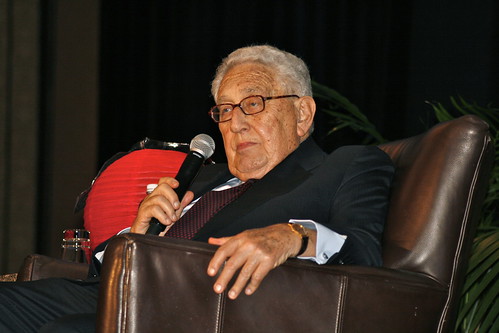Henry Kissinger Only Cared About One Thing
Henry Kissinger #HenryKissinger

Far from blemishing his record, Kissinger’s willingness to inflict remorseless violence in the service of an abstract conception of U.S. grand strategy was precisely his appeal.
Kissinger’s crimes—a nonexhaustive list would include the illegal carpet-bombings of Cambodia and Laos, the extermination campaigns in Bangladesh and East Timor, and the support for right-wing military juntas from Greece to Chile—were not obscure in Washington when they were committed, and have been revealed in ever greater detail since. It has been rare to hear Kissinger’s famous friends deny any of them; the general tendency is to sneer at the idea that ordinary citizens have the standing to bring them up. Far from blemishing his record, Kissinger’s willingness to inflict remorseless violence in the service of an abstract conception of U.S. grand strategy was precisely his appeal. George W. Bush seems at least faintly embarrassed about the hundreds of thousands of Iraqi lives on his conscience, and the Biden administration is currently scrambling to persuade key constituencies that it doesn’t relish the thousands of Palestinian children Israel has killed in U.S.-funded airstrikes over the past two months, but Kissinger never felt the need to apologize for slaughters of even greater magnitude. How could our policy elites help but admire his swaggering, imperial impunity?
Kissinger and I did share one thing in common: a love for the board game Diplomacy, which simulates his approach to manipulating and balancing great powers against one another. As has been previously reported, I spend a lot of my time in a group chat organized around a global-scale variant of the game I co-designed; the variant is named after Klemens von Metternich, the conservative Austrian statesman who shaped the post-Napoleonic balance of power in Europe, and who Kissinger consistently cited as his inspiration. My friends and rivals in the group, a motley crew of left-leaning journalists and policy wonks, all understand the appeal of treating geopolitics as a game that rewards unscrupulous and amoral behavior; where we differ from Kissinger is in confining that behavior to a harmless hobby, as opposed to inflicting it on real nations populated by living human beings.
The shared interest in Diplomacy stemmed from a shared fascination with history, especially the sort of history where powerful men impose their will via powerful states. Earlier this week, I finished Gold and Iron, the late Fritz Stern’s 1977 joint biography of German Chancellor Otto von Bismarck and his Jewish banker and close informal advisor Gerson von Bleichröder, whose financial and diplomatic know-how Bismarck employed in building the Second German Empire and establishing its globe-spanning foreign relations. Bismarck was also one of Kissinger’s personal heroes, and reading about his long correspondence with Bleichröder, it’s hard not to notice parallels to Nixon’s relationship with Kissinger. Like Bleichröder, Kissinger tolerated his political patron’s antisemitism without complaint, placing his own advancement ahead of any kind of tribal loyalty or sentiment. And like Bleichröder, he accrued great rewards for doing so—honors, social clout, wealth, and the power to shape the world.